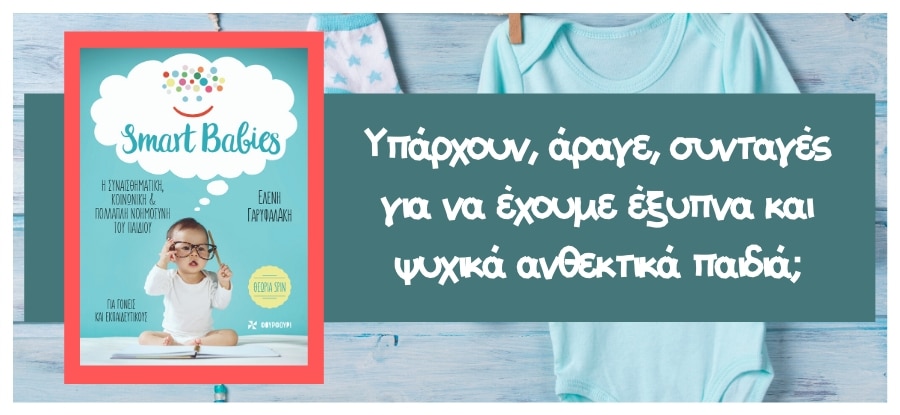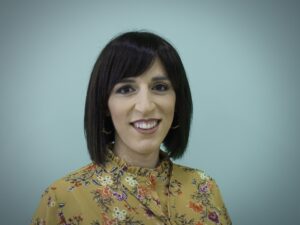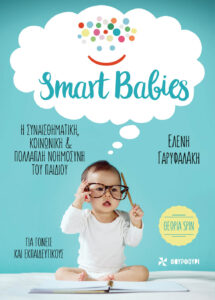"It takes a long way to get there, to the point where our children don't need us, but enjoy our company." – Eleni Garifalaki July 15, 2020 – Posted in: Books, Children, Interview – Tags: parents, education, intelligence, child, multiple intelligence, interview

Interview with Sofia Politou-Ververis about the {pages} for bibliophiles by NAKAS BOOK HOUSE
Your new book "SMART BABIES - The emotional, social & multiple intelligence of the child", from Fourfouri publications, is a combination of creative work with children, but also direct communication with parents and teachers. We would like you to tell us a few words about its content and what you are aiming for through its release?
For almost two decades now that I have been involved in the utilization of the theory of Multiple Intelligences in the learning process, I have been inspired first by the children themselves, certainly by their parents and, many times, by fellow teachers, who have a deep love for their work. The culmination was my own experience as a parent, where I learned to observe every second how a child grows and how cleverly human nature works in both parent and child. This observation ultimately led me to dispel many stereotypes about parenting and delve even more into the broader intelligence of the child, not just the mind. The book also has this goal: to inspire parents and teachers to trust their instincts and experience and to listen to what the child left in their hands really needs in order to grow and "bloom".
From your daily contact with parents, through the seminars Positive Parenting, what do you see as the main insecurities of parents regarding the development of their children?
Seemingly, all parents would like their child to be the smartest, the most capable, the most successful there is. What they themselves say is that they would like their child to be happy, without, however, having defined exactly what happiness is. Or, they still define what happiness is for themselves, ignoring what would really make their child happy. Ultimately, all parents deeply desire one thing, as one mom at a Positive Parenting seminar in 2014 very aptly answered: “What I really desire, which is why I love attending parenting seminars, is for my child to claim life who wants to live, to have a good time, without needing me." It takes a long way to get there, to the point where our children don't need us, but enjoy our company. This, however, shows tremendous self-confidence, in principle ours and, certainly, our children's. Throughout this parenting process, parents need lots and lots of support, mostly emotional.
How open is the field of action of teachers/pedagogues, in terms of their concern for the best possible development of children's multiple intelligences, both in the private and public sectors? From the seminars and various meetings you have with them, do you think they are… richly equipped to achieve this goal? If something is missing, what is it?
Maybe what I'm about to say sounds heretical, but for me educators are not in the scientific field, although neuroscience has a lot to offer to pedagogy. For me, pedagogy is an art. It takes talent, it takes inspiration, it takes passion to work with children and help them grow and develop. Not all educators have the same approach. Some are scientists, with very good knowledge, but they fail to make that emotional connection, which makes all the difference. This is very important to say, because the pedagogues-artists, of which, fortunately, there are quite a few in our country, do not rest, they are constantly looking for ways to inspire children and explore with curiosity and zeal what the latest research in psychology and in neuroscience. Fortunately, I have interacted with dozens of such teachers, in the context of trainings I have done in both the public and private sectors. They are helped by their rich emotional world, their special artistic nature and, if they lack something, it is trust from parents and support from the state. Nevertheless, they continue unscathed and make our world a better place!

In an age where numbers and technology are pulling people by the hand and running at breakneck speed, putting their arts and culture on the backburner, is the point of parents to have "smart kids" or "well-balanced kids"? How can this misattribution and separation of sources of knowledge and cultivation on the part of adults be interpreted through your book so that children develop to the fullest possible all aspects of multiple intelligences?
This is the classic and eternal misunderstanding, that the smart person is the person with good academic skills. When the entire education system and successful survival in it depends on excellent academic abilities, admission to Tertiary Education and good test scores, is it not reasonable for parents to ask their children to "read" and acquire more and more knowledge? And all this, without caring about the education they acquire or their real ability to learn for life or, ultimately, to enjoy and seek learning. Although we would all agree, that these are ultimately what matter, unfortunately, the daily friction with a stupid and outdated education system creates fragile interpersonal relationships and insufficient cultivation and education of children. We need to reach a relatively old age to escape from this "quicksand" and want to discover our talents and multiple intelligences and ultimately find our own meaning in this life.
The personal and unique rhythm that each person has in terms of the development and evolution of intelligence is often not accepted by parents or teachers. The attempt to meet the needs of the average on the one hand, the maintenance of social stereotypes on the other, many children end up experiencing with great intensity, dissatisfaction and anxiety any form of education or parental advice, knowing that we are not all the same. Compulsion, stress, low self-esteem and confidence. What does your book suggest on this matter?
This question follows on nicely from the previous one. As an educator more and as a parent less, since my children are still young, I have noticed all this diminution of the enormous potential that children have, as the years go by. It is the main reason this book was written: to be able to convey a message to parents and teachers to look at the real quality characteristics of children and enhance them, beyond the academic requirements, which, anyway, will be required later on. and, in fact, unfortunately, from early childhood.
Where would you suggest parents and educators focus and how to strengthen emotional safety as a key substrate for experiencing and healthy development of children's multiple intelligences?
Purely in their instinct, that unerring parental instinct, which knows very well, by nature, what the child needs. When we get confused with the "tape" of our own parents, articles on the Internet or what so-and-so has to say in momma groups on social media, well, that's where we get a little lost, and we make mistakes. The emotional connection with the child, from parents and teachers, is very important. It's as simple as conception, you just really like the child in front of you, but it's not easy, I admit. There are many times when there is incompatibility, even within the family, not only between teacher and child. Not all characters match, but we don't have to worry about that. There is always an adult, somewhere, who will love the child unconditionally and inspire him. Certainly, however, adults also need support: from the partner, from the colleague, from the friend.
“…They bloom freely…” you mention, when talking about children's development. Very gentle and sensitive is the thought and identification of children with flowers, the comparison between an English and a French garden comes to mind. The balances are delicate and parents' intentions are often misinterpreted, wanting to give the most to their children, as a result of which an unruly child personality without limits is cultivated. At this point, how do you define freedom and how can parents, teachers and children work together harmoniously in this area?
This observation about the intentions of adults and the lack of boundaries is very correct. Not only that, but generations of children are being created who are very bored, who have a lack of motivation, their souls, in general, are inactive. They look like flowers that we dried and gave them eternal decorative ability! The Japanese philosophy of ikigai gives a beautiful interpretation of freedom when it suggests finding the purpose for which we live. It's not just the money, it's not just the good studies either. Along with these is doing what you love, but also what you can offer to the world to make it better. Unfortunately, I cannot answer how parents, teachers and children could work together, because we are still many steps behind as a society and mentality. Many stereotypes need to be changed.
Tell us about your own pioneering pedagogical theory Spin. How does it differ from other modern pedagogical methods?
If it were a shape, it wouldn't be a closed shape, like a circle or a rectangle. If it were a shape, it would be a spiral, that striking universal symbol that exists everywhere in nature. It also exists in our own nature, spiritual, mental, emotional and mental. Center yourself, your Ego. Remember when you learn best, when your mind is open to experience. It happens when you feel emotionally secure. That's where SPIN starts, from good emotional intelligence, and that's where we first base. Every child is unique and special. It does no good, however, for him to grow up thinking that he is something different from others. We are born to develop mentally and spiritually in a group, in a society. Thus, the SPIN theory emphasizes the group, the social intelligence of the child. We learn a lot from others and we learn best when we are accepted in a social group. Now we can unfold our talents, inclinations and skills, i.e. activate our multiple intelligences. Of course, it doesn't help us to be "the smartest in the village" if we are alone, emotionally empty, without friends and love. It also doesn't help us to keep learning if we don't share what we know and create with others. It is the evolution of the spiral, the culmination of the learning experience, the peer production, the contribution to society as a whole.
Spin theory has its own methodologies, but it is itself more of a philosophy, a pedagogical vision, grounded in emotional, social and multiple intelligences. It combines knowledge of neuroscience, psychology, but also philosophy and pedagogy.
Are you preparing another project? If so, is it related to multiple intelligences or does it relate to some other subject or even category of writing? Would you like to reveal to us its theme?
The book "Smart Babies" is the first in a series of three books, related to the Spin theory and the emotional, social and multiple intelligences of young and old. The second book concerns elementary and high school children, on the subject of gifted children and children with learning difficulties. The third book concerns high school children and adults and is related to the search for the profession that suits us, but also the concept of a smart citizen.
Where can we meet you online and in person?
Online you will find me on all -almost!- social media, especially on the blog kalosagogos.blogspot.com and on Facebook ("Multiple Intelligence", "Smart Babies" and "Kalos Agogos" pages). Up close it will be my pleasure to do Spin actions together in the Multiple Intelligence space I have created, which is called Good conductor and is located in Heraklion, Crete.

